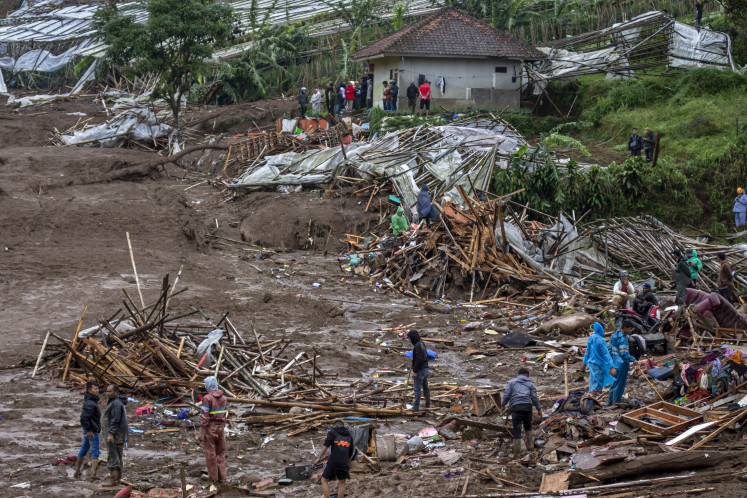Popular Reads
Top Results
Can't find what you're looking for?
View all search resultsPopular Reads
Top Results
Can't find what you're looking for?
View all search resultsGovt action needed on child abuse
Two NGOs in Medan, North Sumatra, blamed government ignorance Wednesday for the city's highest ranking city for child abuse cases in the city
Change text size
Gift Premium Articles
to Anyone
Two NGOs in Medan, North Sumatra, blamed government ignorance Wednesday for the city's highest ranking city for child abuse cases in the city.
In observation of International Children's Day, the Pusaka Indonesia Foundation (YPI) and the Center for Child Protection and Studies (PKPA) said the child abuse cases, reporting mainly violence against children and sexual exploitation, occurred primarily at the workplace and owed much to economic problems and the widespread influence of modern technology such as television and the Internet.
According to data collected by the two NGOs, 182 incidents of child abuse took place from January through July 2008, 80 percent of which occurred in Medan. Of the total, 120 involved sexual exploitation and 15, violence against children. Sexual exploitation incidents was reported in Langkat (12 cases), Deli Serdang (10) and violence against children was reported in Pematang Siantar (eight cases) and Deli Serdang (six).
YPI chair Edi Ikhsan said the sexual exploitation victims were girls aged 2-17 and the violence victims were aged 5-13.
"The sexual abuse was committed by employers at the workplace. Most of the victims were being illegally trafficked to Malaysia. The violence against children cases were committed for the most part by their parents in their home," he said, citing poverty and the negative impact of watching TV as culprits.
PKPA executive director Ahmad Sofyan said the prevalence of violence against children was related to high stress levels among poor families. "Many parents have encouraged and even forced their children to do work they were not supposed to be able to do."
He said many children had to go to Malaysia to seek jobs but in reality they became trapped in a human trafficking syndicate and employed as sexual slaves in the neighboring country.
"Besides being treated inhumanely, they were also underpaid," he said," adding PKPA provided legal assistance in 37 child trafficking and sex abuse cases in 2006, 28 cases in 2007 and 12 cases in the past seven months.
The head of the child correctional section of the Tanjung Gusta prison, Siswanto, expressed concern over juvenile delinquency, saying the prison has gone beyond its capacity with 874 inmates under the age of 17. "They are in jail for drug abuse, theft, murder, gambling and torture."
All three criticized the government for giving no attention to the issue of children's welfare through social rehabilitation, education and health programs.
"The government cannot turn a blind eye to children's problems if we want to lay the country's future on the younger generation's shoulders. It should take concrete measures to stop violence against children and give them opportunities to build their future," said Sofyan.
In Yogyakarta, some 50 street children staged a theatrical protest pointing out the government's diminished attention toward children, saying they were not only denied access to education and healthcare but were also deprived of living a normal life.
Suyadi, who manages a home for the homeless in the city, said he received 50 kilograms of rice and Rp 1.5 million (US$164) annually from an anonymous donor to take care of 15 street children.
"But it's not enough to pay their monthly school fees," he said, adding hundreds of street children had been abandoned in the city.
Muryanto, 16, said he had to go back to the streets to earn a living and save money to go back to school. "I have to drop out because I have no money. I beg at the Sentul market."
In less developed East and West Nusa Tenggara, poverty has subjected poor families to numerous problems affecting children such as a high child mortality rate, malnutrition, child labor, gender bias and school dropouts.
Malnutrition alone claimed 23 lives in East Nusa Tenggara and 20 in West Nusa Tenggara in the past seven months.










